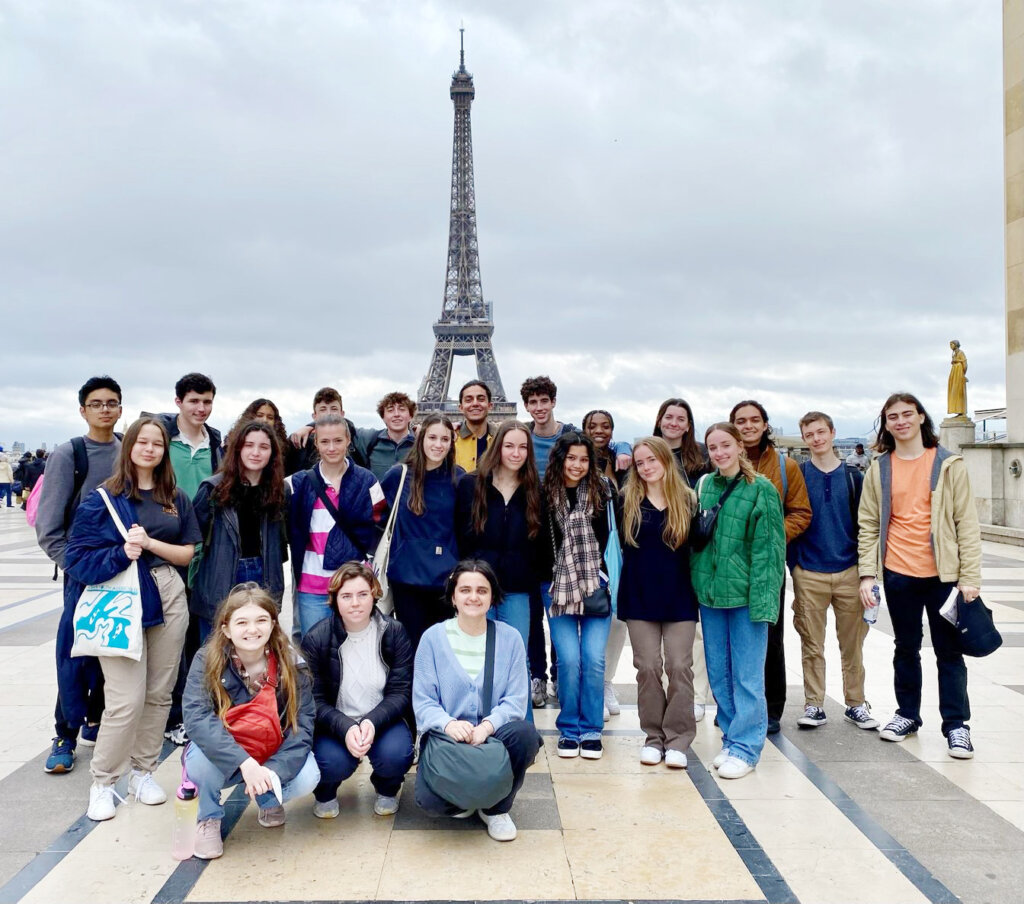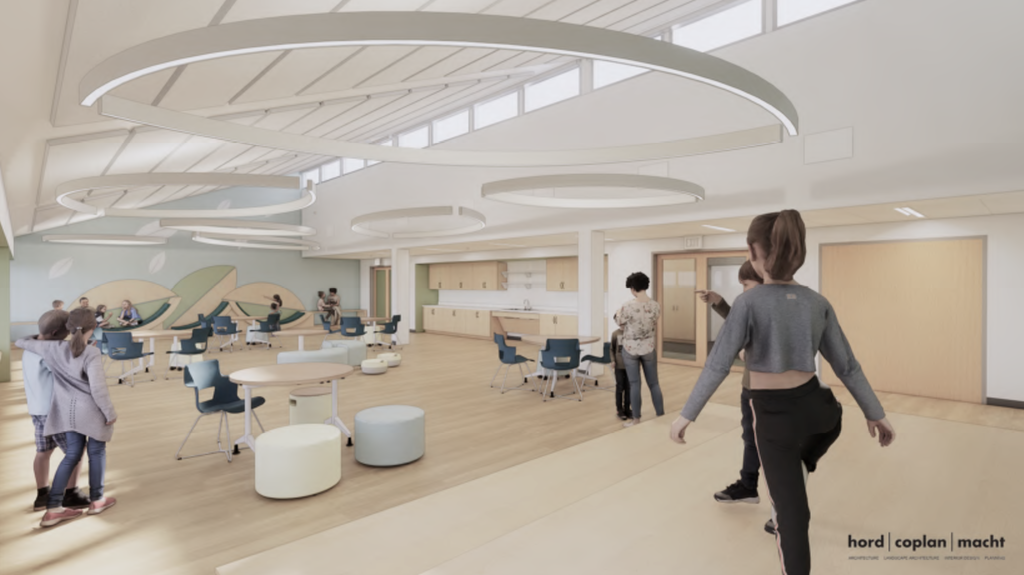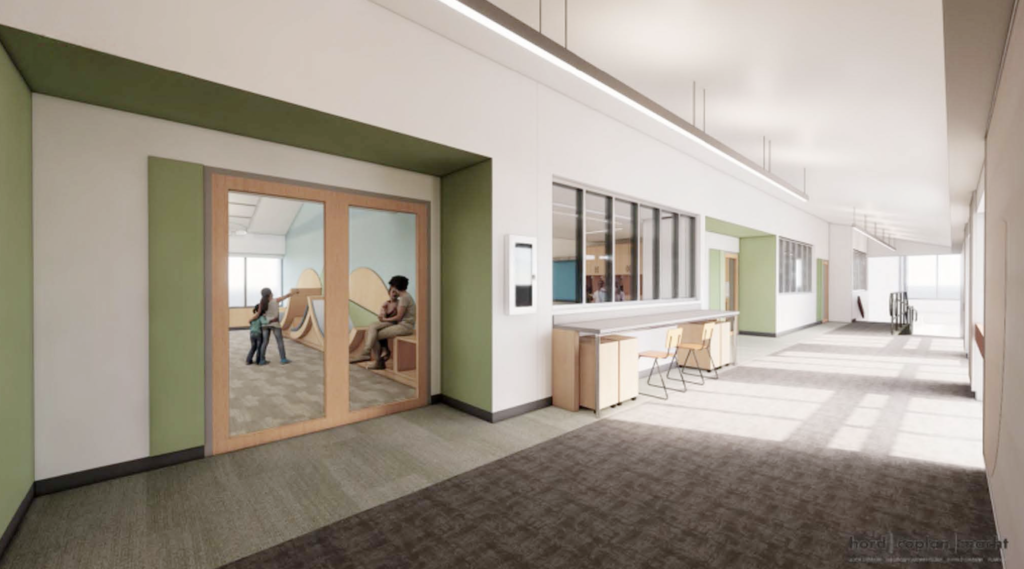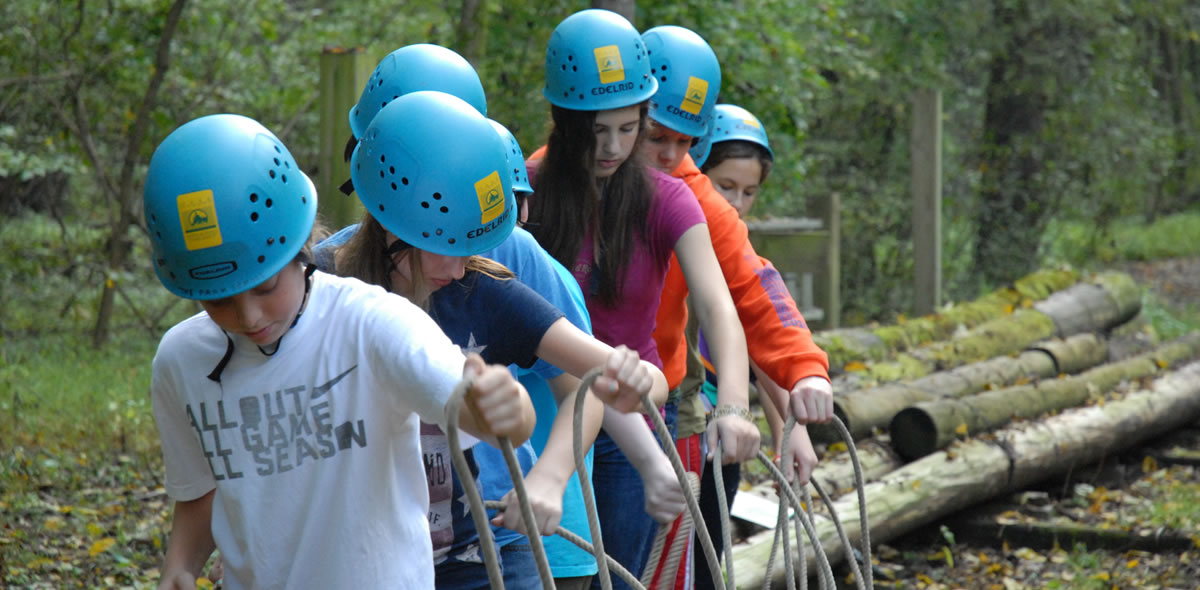Science and Computer Science
The primary goal of the science department is to engage and challenge our students with the hope of producing thoughtful citizens who have the ability, confidence, and enthusiasm to inquire about the natural world.
The science department supports these goals by promoting a durable understanding of the world through the study of chemical, biological, physical, engineering, and computer science principles. Rather than seeing each of these as separate disciplines, we encourage students to grapple with their interaction and mutual influence.
In our classrooms, we emphasize processes of inquiry and thoughtful analysis over rote recitation. We help students learn to question what they observe, to look for evidence for and against a particular viewpoint, and to design tests to collect data to develop increasingly sophisticated models. This emphasis on scientific process and creative problem solving encourages an open-minded and rigorous independence of thought that students then bring to bear on the world around them.
The science department feels strongly that students should have the opportunity to pursue advanced work in the major disciplines. We feel that this is best accomplished by a rich elective program with curricula designed to meet the interests and passions of students.
Requirements
Two year-long courses, Core 9 (Physics, Engineering, and Computer Science), and Core 10 (Chemistry and Biology) are required for graduation.
Core 9: Physics, Engineering, and Computer Science
Grade 9 • Required
This is the first of two foundational courses in Park’s science program. Using an integrated approach, the course examines a careful selection of topics that govern the physical world such as kinematics and electricity, as well as engineering and computer science concepts that dictate the designed world. Integrations of these disciplines consist of utilizing physics as a context for engineering and computer science projects while incorporating computer and engineering skills and models to better understand physics. These concepts will be grounded in hands-on culminating experiences and projects. Throughout the year, the course provides a substantial foundation in laboratory skills with an emphasis on experimentation, design, modeling, and data analysis. Writing is also central to the course, as students learn to form a cohesive argument using both experimental data and scientific theory as support.
Core 10: Chemistry and Biology
Grade 10 • Required
Core 10 is the second of two foundational courses in Park’s science program. This integrated course covers key biological principles, such as ecology, evolution, genetics, and the environment, by grounding them in chemical concepts such as molecular structure and function, solubility, rates of reactions, and equilibrium. The foundational laboratory skills practiced in Core 9 will be expanded upon in Core 10 with an emphasis on original research and statistical significance. The course includes student-driven experimentation both in the lab and outside in Park’s extensive campus. The writing component will include exposure to primary sources of literature to support experimental findings. Throughout the year, this course will offer differentiated levels of challenge; accelerated credit is possible for students who routinely select and achieve the highest level of challenge and rigor. Prerequisite: Core 9.
Physics 2: Mechanics with Calculus (Accelerated)
Grades 10-12
This is a physics class designed to challenge students with a rigorous and in-depth study of the fundamental concepts of mechanics. Topics covered include kinematics, Newton’s laws of motion, work, energy, momentum, rotational motion, and gravity. This course will require hands-on lab work, independent problem-solving, and critical thinking in order to apply concepts to real-world examples and solve complex problems. Assessments will take the form of lab reports, problem sets, presentations, and tests. All students will walk away with a deeper understanding and appreciation of the physical universe as well as with a solid foundation for college-level science classes.
Advanced Topics: Anatomy and Physiology (Accelerated)
Grades: 11-12
This is a demanding course for students looking for a challenge in biology. This course will cover organ systems, kinesiology, immunology, and neurobiology as they pertain to the care and prevention of disease. Students can expect to encounter a large volume of content and to hone writing and research skills in addition to quenching their curiosities about the wonders and limits of the human body. Prerequisite: Permission of the department.
Biology 2: Biotechnology and Biology 2: Biotechnology (Accelerated)
Grades: 11-12
Expanding on the foundational understanding students have from Core 10 about genes and proteins, this course will dive deeply into the molecular details of how genes work. In addition to molecular genetics, students will also learn about inheritance; both classic Mendelian genetics and non-Mendelian. The skills this course focuses on include dissecting complex systems and using figures to support learning, scientific reading, and writing. Biotechnology lab techniques will be taught, with less emphasis placed on experimental design in this course. The accelerated version of this course will assume more comfort with a faster pace while learning detail-heavy information. Prerequisite or corequisite: Core 10; permission of the department is required for accelerated credit.
Biology 2: Ecology and Biology 2: Ecology (Accelerated)
Grades: 11-12
The natural world is all around us, but we often don’t have a well-developed appreciation for how natural systems work and function. Ecology is the study of the interactions between organisms and their environment, and we will begin the course by looking deeply into the underlying ecological processes that drive the natural world. Particular emphasis will be paid to population, community, and ecosystem level processes. Students will be exposed to ecology both in theory and practice, through lectures, readings, discussions, and various field trips and activities both in our woods and other local environments. Additionally, the concept of global change will be a constant thread throughout the course. As the footprint of human activities on ecological systems continues to expand, it is critical to understand how humans have been drivers of ecological change on multiple scales. The skills this course focuses on include field research and lab research, documentation in a lab notebook, and a heavy component of experimental design. In addition, scientific reading and writing will be required. The accelerated version of this course will assume more comfort with a faster pace while learning detail-heavy information. It will also be reading and writing intensive. Prerequisite or corequisite: Core 10. Permission of the department is required for accelerated credit.
Biology 2: Neuroscience
Grades: 11-12
Have you ever wondered what makes you tick, what it means to be human? Are you curious about the secrets hidden inside your brain? This course will challenge students to begin unraveling the mysteries of the human brain through discussion, case studies, and interactive experiments. Specific topics covered could include neuroanatomy and function, synaptic transmission and processing, movement, sleep and wakefulness, hunger, thirst, mental health, emotional responses, recovery of function after brain damage, and various neurological and psychiatric disorders. Students will be expected to use current scientific research to explore the ethical dilemmas and real-world impacts of brain science, sparking discussions about our future in a world shaped by deeper neurological understandings. Reading, writing, experimentation, and project-based learning will be essential; assessments will also consist of written case studies, projects, lab analyses, tests, and presentations. Prerequisite: Core 10.
Chemistry 2: Reactions and Chemistry 2: Reactions (Accelerated)
Grades: 11-12
Chemical reactions are all around us from the combustion reactions used to power cars to reactions used to clean our wastewater and keep our drinking water safe. In this quantitatively-based course, students will consider questions like, how do we predict the products of a chemical reaction? How can we control how quickly a reaction occurs? Can we stop a reaction from occurring or cause a reaction to occur? Topics covered include stoichiometry, types of reactions, rates of reactions, equilibrium systems, and acid-base chemistry. The regular class will focus more on biological applications of these concepts. The accelerated course is fast-paced, reading and writing intensive, requires algebra facility, and independent lab work. Prerequisite: Core 10; permission of the department is required to take the accelerated class.
Computer Science 2: Game Creation in Javascript
Grades: 10-12
Did you enjoy creating basic games in p5.js during Core 9? Are you interested in learning more advanced concepts in computer science and exploring different platforms for game creation? In this course, students will learn fundamental coding concepts while creating original games in JavaScript. Students will gain proficiency with using arrays for handling collections of data, writing their own loops, and using functions to modularize code and improve readability; the course will introduce some object-oriented coding principles. In the second half of the course, students will explore platforms for designing web-based games while learning some principles of software engineering. Prerequisites: Core 9 or permission of department.
Computer Science 2: Python (Accelerated)
Grades: 10-12
This fast-paced course is an introduction to the Python programming language, a relatively easy language to learn, that provides the basic conceptual underpinnings of the important ideas in computer science. Students spend the first half of the class expanding on the concepts they learned about in Core 9: loops, arrays, string and number manipulation, and functions. In the second half of the course, students begin exploring more advanced issues in computer science, including graphical interfaces, recursion, object-oriented programming, data structures, and runtime complexity. Prerequisite: Core 9 and/or permission of the department.
Engineering 2: Electrical Engineering
Grades: 10-12
From smartphones to appliances, digital circuits are all around us. This course provides a foundation for students who are interested in electrical engineering, electronics, or circuit design. Students study topics such as combinational and sequential logic and are exposed to circuit design tools used in industry, including logic gates, integrated circuits, and programmable logic devices. Students will develop key engineering skills including teamwork, communication methods, and technical documentation. Students will analyze, design, and build digital electronic circuits. While implementing these designs, students will continually hone their professional skills, creative abilities, and understanding of the circuit design process. The class will be expected to solve problems and learn through doing, experimentation, and collaboration. An accelerated version of the class is offered in the spring. Prerequisite: Core 10 and permission of the department.
Engineering 2: Mechanical Engineering Principles (Accelerated)
Grades: 11-12
This course introduces students to engineering concepts that are applicable to a variety of engineering disciplines and empowers them to develop technical skills through the use of engineering tools such as 3-D modeling software, hands-on prototyping equipment, programming software, and robotics hardware to bring their solutions to life. Students will apply the engineering design process to solve real-world problems across a breadth of engineering fields such as mechanical, robotics, infrastructure, environmental sustainability, and product design and development. This project-based learning course will include solving open-ended problems that provide opportunities to develop planning and technical documentation skills, as well as transferable life skills such as problem solving, critical thinking, collaboration, communication, and ethical reasoning. The last is particularly important as this course will encourage students to consider the impacts of engineering decisions. Some topics covered will include, but are not limited to, product design and development, designing infrastructure and development sustainability, mechanical design, and application of robots. An accelerated version of the class is offered in the spring, as well. Prerequisite: Core 10.
Engineering 2: Kinetic Sculpture Race
Grades: 10-12
What do a giant pink poodle, an overgrown platypus, and a Viking ship have in common? They were all past entries of the Kinetic Sculpture Race. In this class, students will use the engineering design process to develop a human-powered amphibious vehicle. The team will enter this vehicle in a race hosted by the American Visionary Art Museum in downtown Baltimore. Entrants must propel their mechanized marvels through 15 miles of the city, including sand and mud pits in Patterson Park and a jaunt through the harbor at the Canton waterfront. This course will also be offered in the spring, where those students will pick up where fall students will have left off. All students (fall and spring) will participate in the race, which is held the first Saturday in May. This is considered a broadly accessible elective for those students who are interested in an introduction to engineering topics. The course requires facility with algebra and an eagerness to think outside of the box to solve problems in a systematic way.Prerequisite: Core 9.
Physics 2: Electricity and Magnetism (Accelerated)
Grades: 10-12
This fast-paced, calculus-based physics course offers an intensive exploration of the theory of electricity and magnetism, as organized by Maxwell’s Equations. Combining hands-on experiments with discussions using mathematical language of calculus and vectors, students will develop both conceptual and quantitative knowledge of the theory. Topics will include electrostatic force, electric fields, electric potential, circuits incorporating capacitor, magnetic fields, induction, and electromagnetic waves. Assessment consists of lab reports, problem sets, presentations, and tests. This course will provide the foundation for students interested in the physical sciences or engineering. Prerequisite: Core 9; corequisite or prerequisite: Calculus (Accelerated).
Physics 2: Mechanics
Grades: 10-12
Within the broad category of Newtonian Mechanics, this course picks up where Core 9 left off. With some review of prior content, this lab-based, problem-solving course will cover a deeper exploration into kinematics, Newton’s laws, and energy. Depending on class interest the final unit(s) can cover circular motion, gravitation, and/or waves. This course is intended for students interested in Physics or Engineering. Students will walk away with a deeper understanding and appreciation of the field of physics. Prerequisite: Core 9.
Physics 2: Waves
Grades: 10-12
From Simple Harmonic Motion to Sound, Light, and Quantum Mechanics, waves permeate the universe. This algebra-based, experimental-focused physics class will use labs to investigate the underlying properties of waves and apply them to a wide range of phenomena. Topics will include Vibrations and Waves, Sound and Harmonics, Light and other EM waves, Reflection and Refraction, Interference and Diffraction, and Waves in Modern Physics. Students will be assessed through a combination of lab work, quizzes, tests, and projects. Prerequisite: Core 9.
Advanced Topics: Plastics (Accelerated)
Grades: 11-12
This is an interdisciplinary biology and chemistry course. Students will begin by understanding the complexity of plastic pollution as both an ecological and cultural issue. From a biological perspective, students will explore the macroscopic and microscopic understanding of plastic contamination. From a chemical perspective, students will then study the molecular structure of plastic polymers and explore the challenges that come along with biodegradable plastics. There will be a service component to this course that relates to mitigating plastic pollution. Prerequisite: Core 10 and permission of the department.
Biology 2: Aquatic Ecosystems (Accelerated)
Grades: 11-12
As three quarters of the globe is covered in water, this course will introduce the class to all of the aquatic ecosystems. Students will cover everything from oceans to estuaries, wetlands to lakes, ponds to streams. They will examine the biology and geology of aquatic ecosystems and dive deep into the impact of humans on these ecosystems. This course will be reading, writing, and lab intensive. There will be numerous short field trips to visit nearby Maryland aquatic ecosystems and opportunities to collaborate with local scientists. Prerequisites: Core 10 and permission of the department.
Biology 2: Extinctions and Biology 2: Extinctions (Accelerated)
Grades: 11-12
This course will introduce students to the five major extinctions of Earth’s past as the vehicle for exploring the history of life on earth. It will focus on the conditions that lead to each extinction and the explosions in biodiversity that occurred as a result. There will also be an emphasis on the state of mass extinction happening today on our planet. The fields of paleontology and geology will be introduced as needed to understand the consequences and benefits of each major extinction and what nuggets of wisdom can be gleaned for the future of life on earth. This course will include the genetic technique of barcoding to unveil evolutionary relationships between species currently living in the pond, stream, and woods of Park School’s campus. This work will inspire opportunities to work in collaboration with local scientists. Reading, writing, and experimenting will be essential to the class. Prerequisite: Core 10. Permission of the department is required to take this class for accelerated credit.
Chemistry 2: Matter and Chemistry 2: Matter (Accelerated)
Grades: 11-12
Why is kevlar so strong? Why do diamonds last forever? How can water exist as a solid, liquid, and gas at the same time? Why do hot air balloons float? This course will explore the relationships between structure and properties of matter. Students will be asked to make inferences about properties from data and models. Topics covered include: atomic structure, molecular structure, intermolecular forces, states of matter, stoichiometry, electrochemistry. This course will be taught in both accelerated and regular versions. The accelerated course is fast-paced, reading, and writing intensive, requires algebra facility, and independent lab work. Prerequisite: Core 10 and permission of the department for the accelerated course.
Computer Science 2: Data Science and Machine Learning (Accelerated)
Grades: 10-12
This fast paced course will teach students the fundamental principles of working with data in Python from cleaning and loading data to creating predictive models for a data set. Students will learn about the Python libraries that are essential for data science including NumPy, Pandas, Matplotlib, and Scikit learn. They will clean and visualize data, search for trends in large datasets, and model numerical and categorical data, using linear regression and machine learningalgorithms such as k-means clustering, and random forests – all while critically evaluating the usefulness and application of different algorithms for modeling a given problem. The course will be problem-based and project-based. Students will be graded based on their code and written explanations of that code. Prerequisite: Successful completion of Python (Accelerated), OR permission of the department.
Computer Science 2: Python Projects: Object-Oriented Design
Grades: 10-12
In this course, students will apply their knowledge of object oriented programming to design, develop, test, and deploy a software program to solve a real world problem. This class aims to grow student programming skills while learning about software development methodologies. The course will introduce students to the Agile approach to software development and provide them with the opportunity to authentically apply the Agile methodology while building a software solution. Students will work through a development process that begins with gathering requirements and understanding the problem they are trying to solve. From there, they will iteratively design, develop, test, and revise their software solution based on feedback. The course is based around one large scale software project where students will develop an interactive simulation to illustrate a science concept, such as evolution or kinetic molecular theory, that is difficult to study/observe directly (think of PHET simulations). Students will work on a team throughout the semester and daily collaboration with peers will be an essential part of the course. Prerequisite: Core 10 and Python (regular or accelerated) or Game Creation in JavaScript.
Engineering 2: Electrical Engineering (Accelerated)
Grades: 10-12
From smartphones to appliances, digital circuits are all around us. This course provides a foundation for students who are interested in electrical engineering, electronics, or circuit design. Students study topics such as combinational and sequential logic and are exposed to circuit design tools used in industry, including logic gates, integrated circuits, and programmable logic devices. Students will develop key engineering skills including teamwork, communication methods, and technical documentation. Students will analyze, design, and build digital electronic circuits. While implementing these designs, students will continually hone their professional skills, creative abilities, and understanding of the circuit design process. Students will be expected to solve problems and learn through doing, experimentation, and collaboration. The accelerated version of this course is fast paced and much more math intensive than the regular version. Students who have taken Electrical Engineering (Regular) are not eligible to take this class.
Engineering 2: The Kinetic Sculpture Race
Grades: 10-12
What do a giant pink poodle, an overgrown platypus, and a Viking ship have in common? They were all past entries of the Kinetic Sculpture Race. In this class, students will use the engineering design process to develop a human-powered amphibious vehicle. The team will enter this vehicle in a race hosted by the American Visionary Art Museum in downtown Baltimore. Entrants must propel their mechanized marvels through 15 miles of the city, including sand and mud pits in Patterson Park and a jaunt through the harbor at the Canton waterfront. Students will participate in the race, which is typically held the first Saturday in May. This is considered a broadly accessible elective for those students who are interested in an introduction to engineering topics. This course requires facility with algebra, and an eagerness to think outside of the box and solve problems in a systematic way. Prerequisite: Core 10.
Integrative Medicine
Grades: 11-12
This course in integrative medicine aims to review current scientific research on practices that work alongside traditional Western medicine. It will build an appreciation for mindbody medicine and reflect key concepts introduced to medical school students. Students will learn the basic anatomy needed to understand the mechanisms of pain, stress, and sleep. Methodologies will include meditation, yoga, aromatherapy, music, tapping, and others. There will be a significant journaling component to the course as well as required volunteering that will generally occur during class time. Prerequisite or corequisite: Core 10.
Molecular Gastronomy
Grades: 11-12
This course will cover the biology and chemistry of food and cooking, from the fundamental molecules of food to the thickening of sauces to the starch molecules in bread. Students will delve into the science behind why foods behave certain ways – what happens when they knead bread dough or how whipped cream turns into butter. The class will not be cooking from recipes, but rather from fundamental principles, and any eating of the products will be for the purposes of scientific observation. This course will be heavily lab-based and may require some cooking to be completed outside of class. Prerequisite: Core 10.
Physics 2: Astronomy
Grades: 11-12
This course will use experiments and activities to explore our growing understanding of the universe. Students will learn how we found our place in the universe and study the technologies that have allowed us to develop this understanding. The course will build on this work to explore the solar system and our historic and future exploration of space. Students will then study stellar and galactic evolution before delving into cosmology ideas. The course will conclude with a unit on astrobiology. This course is accessible to students comfortable with Algebra and Trigonometry.
Physics 2: Biophysics and Physics 2: Biophysics (Accelerated)
Grades: 11-12
This course looks to combine and advance students’ backgrounds in physics, biology, and chemistry to explore concepts that explain how life works. Students will learn how these fields of science converge and will dive into how advanced experimental techniques are used in modern research to solve complex biological problems. Some of the concepts will include protein folding and interaction, entropy in biological systems, how energy drives a lot of interactions, and various laboratory techniques that use physics to explore biological processes. The first half of the course will begin by developing background information and introducing important concepts in biophysics. The second half of the course will be more research-oriented and will both explore how research is done in a college environment and will allow each student to explore independent interests related to biophysics. This class will explore a range of topics that draw on concepts from both Core 9 and Core 10 classes. The accelerated course will focus more on the statistics and math involved in biophysics, whereas the regular section. Prerequisite(s): Core 10 and permission of the department for the accelerated course.
Physics 2: Medical Imaging
Grades: 11-12
How can we examine the inside of the human body without surgery? How does physics make medical imaging techniques possible? This course introduces the physics principles and applications of various medical imaging modalities, including X-ray, Computed Tomography (CT), Magnetic Resonance Imaging (MRI), Ultrasound, and Nuclear Medicine. Students will learn how these techniques use radiation to interact with biological tissues and how these interactions create images. Identifying anatomical structures on different types of images will be introduced, but will not be the main focus. Instead, this course will focus on the understanding of physics processes involved in image acquisition, formation, and interpretation. Assessments will consist of problem sets, tests, projects and presentations. Prerequisite: Core 9.





